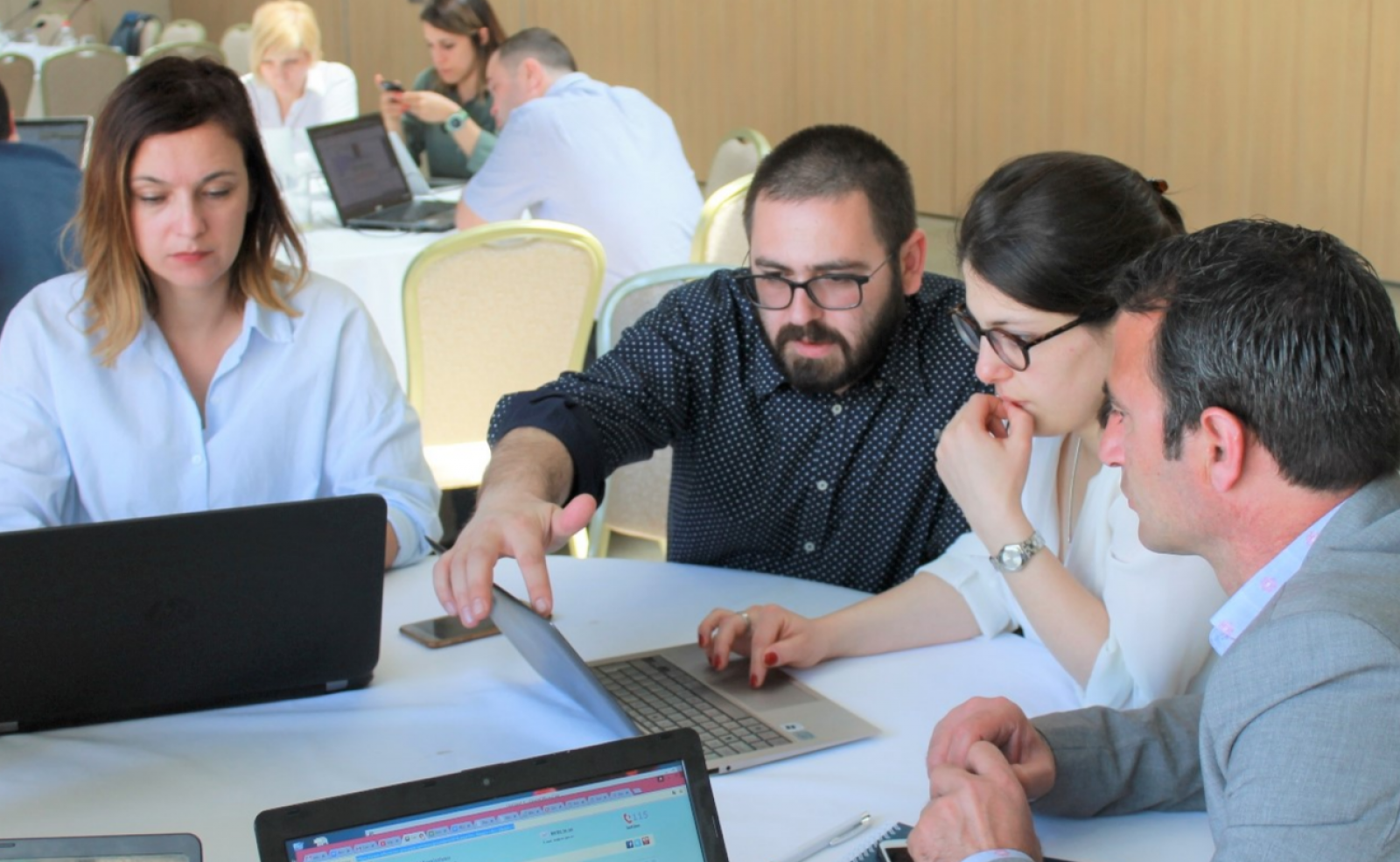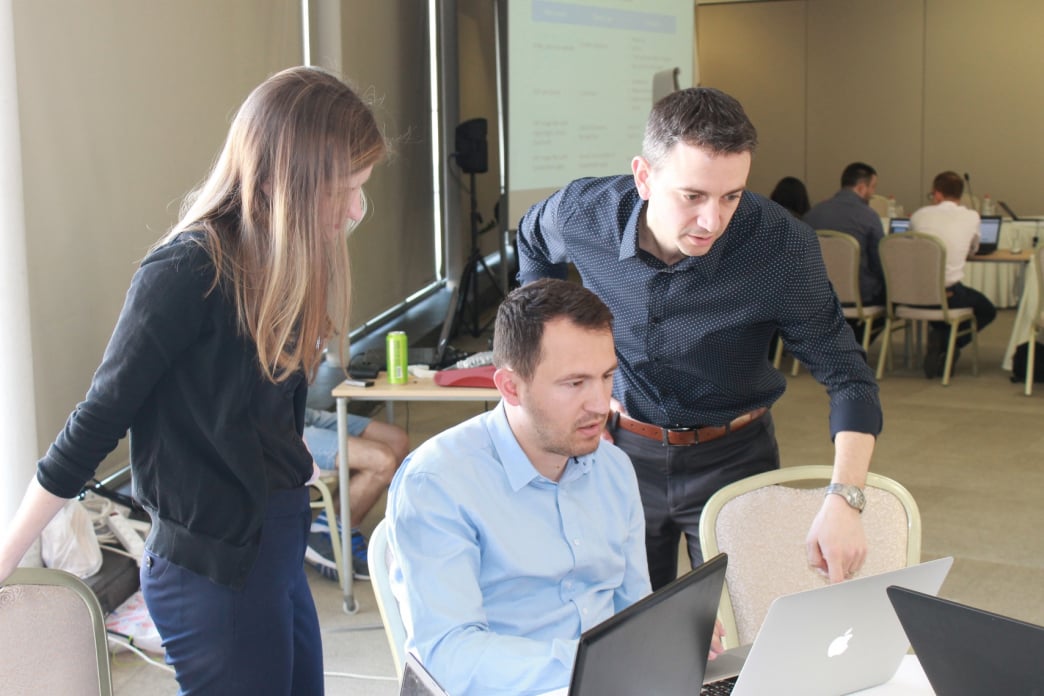
Civil society leaders from Albania, Bosnia and Herzegovina, and Georgia practice using tools to scrape and analyze election data.
SHARE
Open Data Academy

While disinformation in traditional media has been used for decades, digital disinformation and computational propaganda, which uses artificial intelligence and political “bots” or pieces of code to manipulate public opinion online, have grown exponentially. An increasing number of elections across Europe and Eurasia are influenced by disinformation tactics.
To address this challenge, NDI conducted a four-day academy for 15 citizen election monitoring organizations from 11 countries. The event, which was held in Belgrade in April 2018, provided citizen activists with new strategies, skills, and tools to identify and expose disinformation during elections and to use electoral data to raise the level of fact-based discourse.
The academy, titled Information and Electoral Integrity: Open Data Analysis and Disinformation Monitoring, was held amidst the increasing use of disinformation by authoritarian regimes and other actors to distort media coverage, pollute political discourse, and undermine democratic institutions within and outside their borders. NDI research has helped illuminate these tactics, which populations are most vulnerable, and potential ways to counter disinformation tactics. Participants discussed how election-related disinformation has amplified ethno-nationalist conflicts and xenophobic prejudices, stoked anti-Western sentiments, entrenched incumbents, and fomented disillusionment with the election process and democracy more broadly.
The use of disinformation presents new and unique challenges for citizen election monitors, who must adapt their approaches, methodologies and tools to integrate disinformation monitoring into observation efforts. They are also seeking to leverage partnerships with relevant media monitoring groups, academics, and journalist initiatives. The academy in Belgrade provided an opportunity for leading observer groups to learn about and share innovations and best practices across borders to ensure a coordinated, more unified response.
“We view this as a foundational meeting for a group of activists who will think practically about how to tackle disinformation in elections,” said Robin Carnahan, NDI board member and former Missouri secretary of state, who provided opening remarks and participated in sessions focused on combating disinformation.
Laura Pavlovic, director of USAID Serbia’s Office of Democratic and Economic Growth, also provided opening remarks, drawing on her experience shaping democracy assistance programs around the world. “The work of citizen election observers is one of the most important safeguards we have against the erosion of faith in democratic institutions,” Pavlovic said.
Academy participants learned how to combat disinformation in elections by:
- assessing the information environment surrounding their elections;
- monitoring disinformation in traditional media and social media;
- leveraging public opinion research; and
- collaborating more effectively with other stakeholders working to combat disinformation, including fact-checkers, journalists, and civic tech activists.
Each participant came away from the academy with specific points of action that they will take back to their election observer groups to enhance their respective election monitoring efforts. For example, several groups, including those from Albania, Georgia, Macedonia, and Ukraine, plan to monitor disinformation in social media, while others in Kyrgyzstan and Serbia will draw on their public opinion research to better target their efforts to expose disinformation tactics.
An important way that electoral management bodies and election observers can combat disinformation is by making election data open. Transparent, accessible data can help inoculate electoral management bodies from rumors and disinformation while increasing citizens’ ability to fact-check information they may receive from third parties. Many electoral management bodies are increasingly making election data, such as voters lists and election results, publicly available. At the same time, election observers have become more vocal in promoting election data that is truly "open", drawing on broader open government data principles. NDI has developed the Open Election Data Initiative to help build on this momentum.
The work of citizen election observers is one of the most important safeguards we have against the erosion of faith in democratic institutions.
- Laura Pavlovic, USAID
NDI election experts and data-inclined citizen observer activists led participants through practical, hands-on sessions highlighted best practices for obtaining, analyzing, and using official election data to advance electoral integrity. Several of these data cleaning and analysis modules are available at NDI’s online Election Data Academy in multiple languages.
The academy also equipped participants with practical skills and tools to convert and extract data from "locked" file formats, such as PDF files, into analyzable formats. “Free play” sessions allowed participants to experiment with these tools to unlock data sets from their own country. NDI also demonstrated its Scrape the Vote and Rapid Data Digitization tools, which help groups quickly capture and convert data from handwritten forms, such as tally sheets, into analyzable data sets. The participants also discussed strategies and tactics to advocate for election management bodies to provide election data in a manner that is truly open.
The event, which was organized through NDI’s Regional Elections Administration and Political Processes Support (REAPPS) program supported by USAID, was an extension of the Institute’s INFO/tegrity and Open Election Data initiatives. Participants at the Belgrade academy included citizen election observer activists from Albania, Bosnia and Herzegovina, Georgia, Kosovo, Kyrgyzstan, Macedonia, Moldova, Montenegro, Poland, Serbia, and Ukraine; as well as international election experts from NDI.


